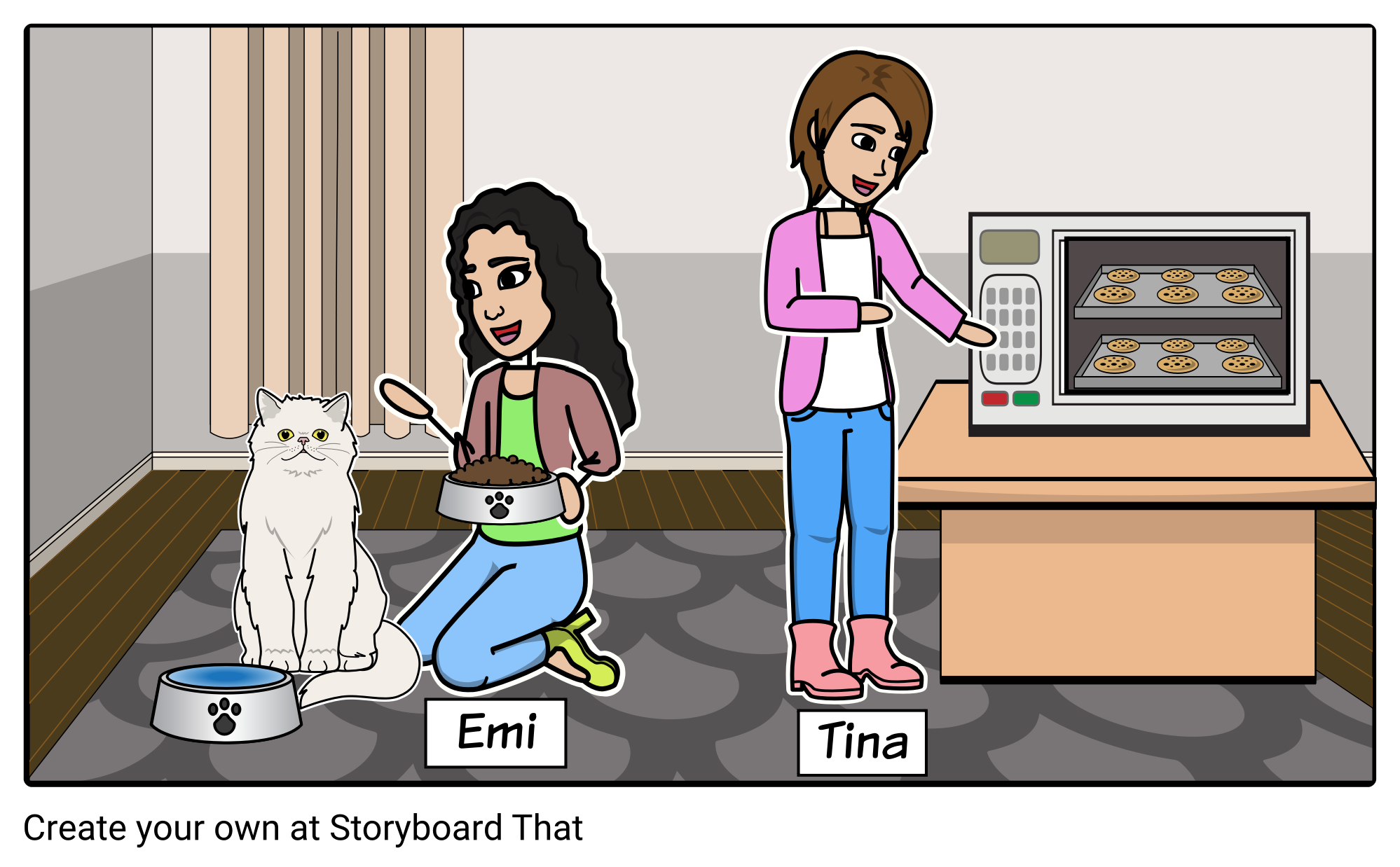LESSON GOAL
Let’s check our lesson goal.
In this material, you will learn how to use adverbs of frequency in sentences.
In this material, you will learn how to use adverbs of frequency in sentences.
この教材では、頻度を表す副詞を使って話す練習をします。
PART A_1
Let’s read the sentences aloud. Please repeat after me.
文章を音読しましょう。講師に続いて読んでください。
PART A_2
PART B_1
Study the picture for 1 minute. Describe what each character does by completing the sentences with the correct adverbs of frequency.
1分間イラストを見てください。その後、頻度を表す副詞を使ってそれぞれのキャラクターを表す文章を完成させてみましょう。
PART B_2

| 1. | What does Emi always do? |
| Answer: | Emi ________ feeds her cat. |
| 2. | What does Tina do sometimes? |
| Answer: | Tina _________ bakes cookies. |
PART C_1
Let’s read the dialogue. I will play Ron and you will play Emma. Then, we’ll switch roles.
以下の会話文を読みましょう。最初に講師がRon、あなたがEmmaの部分を読みます。終わったら交代しましょう。
PART C_2

Nice to see you here in the school garden, Emma. Do you often come here to study?
|
Nice to see you too, Ron. Yes, I sometimes come here to do my homework. How about you? |

I rarely come here to study. I usually go to the library before going home.
|
That’s good. We’ll have our midterm exams next week, so I think I need to come here frequently to review. |

You’re right. You never get low scores in the exams, so I don’t think you have to worry about it.
|
Thank you, Ron. See you around. |
PART D_1
Please answer the questions in complete sentences.
質問に対して文章で答えてみましょう。
PART D_2
| 1. | Where does Emma sometimes go to do her homework? |
| Answer: | |
| 2. | Where does Ron usually go before going home? |
| Answer: | |
| 3. | Does Emma get low scores in the exams? |
| Answer: |
PART E_1
Let’s talk. Please answer my questions. You may ask questions, too.
会話練習をしましょう。講師が質問しますので答えてみましょう。また、講師に質問してみましょう。
PART E_2
| 1. | How often do you go out with your friends/family? |
| Answer: | |
| 2. | How often do you clean your room? |
| Answer: | |
| 3. | What is the first thing that you always do upon waking up? |
| Answer: | |
| 4. | What do you always do before you go out? |
| Answer: | |
| 5. | Is there an activity you never forget to do before going to bed? |
| Answer: |
REVIEW AND FEEDBACK
Now, let us review the things that you learned in this lesson.
ではこのレッスンで学んだことを振り返りましょう。
(Please give a short feedback on how your student did on your class.)
| Grammar 文法 |
Pronunciation 発音 | Vocabulary 単語 |
Comprehension 理解 |
|
|---|---|---|---|---|
 GOOD GOOD |
文法の誤りはほとんどなく、完全な文章で話すことができる | ほとんどの単語をはっきりと正しく発音することができる | 習った表現を適切に使うことができる | 文章を理解し、質問に正しく答えることができる |
 FAIR |
文法の誤りはあるが、完全な文章で話すことができる | 発音の練習が必要な言葉がいくつかある | たまにミスはあるが、習った表現を適切に使うことができる | 文章を完全に理解するのは難しく、質問に正しく答えられないときもある |
 POOR |
文章で話すのは難しく、単語だけで話すことができる | 発音の練習が必要である | 習った単語と表現を少しだけ使うことができる | 文章を理解するのは難しく、質問に答えるのは難しい |
レッスン教材に関するアンケートのお願い
レッスン教材の改善・拡充を図ることを目的とし、アンケートを実施しております。
以下のURLからアンケートにお答えいただき、 ご意見・ご要望をお聞かせください。
アンケートはこちら